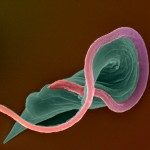Lien vers Pubmed [PMID] – 34903666
Lien DOI – e211374411810.1073/pnas.2113744118
Proc Natl Acad Sci U S A 2021 12; 118(51):
How genome instability is harnessed for fitness gain despite its potential deleterious effects is largely elusive. An ideal system to address this important open question is provided by the protozoan pathogen Leishmania, which exploits frequent variations in chromosome and gene copy number to regulate expression levels. Using ecological genomics and experimental evolution approaches, we provide evidence that Leishmania adaptation relies on epistatic interactions between functionally associated gene copy number variations in pathways driving fitness gain in a given environment. We further uncover posttranscriptional regulation as a key mechanism that compensates for deleterious gene dosage effects and provides phenotypic robustness to genetically heterogenous parasite populations. Finally, we correlate dynamic variations in small nucleolar RNA (snoRNA) gene dosage with changes in ribosomal RNA 2′-O-methylation and pseudouridylation, suggesting translational control as an additional layer of parasite adaptation. Leishmania genome instability is thus harnessed for fitness gain by genome-dependent variations in gene expression and genome-independent compensatory mechanisms. This allows for polyclonal adaptation and maintenance of genetic heterogeneity despite strong selective pressure. The epistatic adaptation described here needs to be considered in Leishmania epidemiology and biomarker discovery and may be relevant to other fast-evolving eukaryotic cells that exploit genome instability for adaptation, such as fungal pathogens or cancer.





